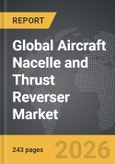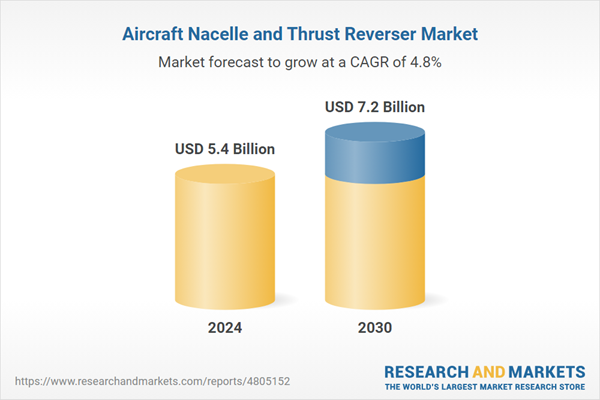Global Aircraft Nacelle and Thrust Reverser Market - Key Trends and Drivers Summarized
What Are Aircraft Nacelles and Thrust Reversers and Why Are They Critical?
Aircraft nacelles and thrust reversers are crucial components of modern jet engines, playing essential roles in both engine operation and aircraft performance. The nacelle is the housing that encases the engine, providing aerodynamic efficiency, reducing drag, and protecting the engine from environmental factors. It also integrates various subsystems such as cooling, fire suppression, and noise reduction technologies. Thrust reversers, on the other hand, are devices built into or attached to the nacelle that help decelerate the aircraft upon landing by redirecting the engine's thrust forward. This functionality is vital for reducing landing distances and enhancing safety, particularly on wet or short runways. The performance and reliability of these components are paramount as they directly impact the overall efficiency, safety, and operational costs of the aircraft.How Have Technological Advancements Transformed Nacelle and Thrust Reverser Systems?
Technological advancements have significantly transformed nacelle and thrust reverser systems, making them more efficient, lighter, and quieter. The use of advanced materials such as composites and titanium has led to substantial weight reductions, which in turn improves fuel efficiency and reduces emissions. Innovations in aerodynamics have enhanced the design of nacelles to minimize drag and improve airflow, thereby boosting engine performance. Additionally, modern thrust reversers are equipped with more effective noise reduction technologies, contributing to quieter operations. The integration of smart sensors and real-time monitoring systems allows for better maintenance and early detection of potential issues, reducing downtime and enhancing reliability. These advancements ensure that modern nacelle and thrust reverser systems not only meet but exceed the stringent requirements of contemporary aviation.What Challenges Do Manufacturers Face in Developing Advanced Nacelle and Thrust Reverser Systems?
Developing advanced nacelle and thrust reverser systems involves navigating several challenges, including meeting rigorous safety and performance standards, integrating new materials and technologies, and balancing cost with efficiency. Regulatory bodies like the FAA and EASA impose strict certification processes to ensure these systems can withstand extreme operational conditions and perform reliably. This involves extensive testing and validation, which can be both time-consuming and costly. Integrating advanced materials and technologies requires sophisticated engineering to ensure compatibility and maintain structural integrity. Additionally, manufacturers must consider the economic aspects, striving to produce cost-effective solutions that do not compromise on performance or safety. Environmental regulations also push for innovations that reduce noise and emissions, adding another layer of complexity to the development process. Overcoming these challenges requires continuous research, innovation, and collaboration among aerospace engineers, material scientists, and regulatory authorities.What Factors Are Driving the Growth in the Aircraft Nacelle and Thrust Reverser Market?
The growth in the aircraft nacelle and thrust reverser market is driven by several factors, including advancements in materials and technologies, increasing demand for fuel-efficient and quieter aircraft, and the expansion of the global aviation industry. Technological innovations, such as the development of lightweight composites and advanced noise reduction systems, are propelling the market forward by offering improved performance and efficiency. The rising global air traffic and the consequent increase in aircraft deliveries necessitate the development and production of advanced nacelle and thrust reverser systems. The emphasis on improving fuel efficiency and reducing maintenance costs is also driving airlines to adopt more sophisticated solutions. Additionally, regulatory requirements mandating higher safety and environmental standards are pushing manufacturers to innovate continually. Collaborations between aerospace manufacturers, material scientists, and regulatory bodies are fostering the development of cutting-edge nacelle and thrust reverser technologies, ensuring they meet the evolving needs of the aviation industry.Report Scope
The report analyzes the Aircraft Nacelle and Thrust Reverser market, presented in terms of market value (USD). The analysis covers the key segments and geographic regions outlined below.- Segments: Material (Alloys, Composites, Stainless Steel); Product (Thrust Reversers, Aircraft Nacelles, Engine Build-up Units, Exhaust Systems); Engine Type (Turbofan, Turboprop, Turboshaft).
- Geographic Regions/Countries: World; United States; Canada; Japan; China; Europe (France; Germany; Italy; United Kingdom; Spain; Russia; and Rest of Europe); Asia-Pacific (Australia; India; South Korea; and Rest of Asia-Pacific); Latin America (Argentina; Brazil; Mexico; and Rest of Latin America); Middle East (Iran; Israel; Saudi Arabia; United Arab Emirates; and Rest of Middle East); and Africa.
Key Insights:
- Market Growth: Understand the significant growth trajectory of the Alloys Material segment, which is expected to reach US$4.6 Billion by 2030 with a CAGR of 4.8%. The Composites Material segment is also set to grow at 5.4% CAGR over the analysis period.
- Regional Analysis: Gain insights into the U.S. market, valued at $1.4 Billion in 2024, and China, forecasted to grow at an impressive 7.3% CAGR to reach $1.6 Billion by 2030. Discover growth trends in other key regions, including Japan, Canada, Germany, and the Asia-Pacific.
Why You Should Buy This Report:
- Detailed Market Analysis: Access a thorough analysis of the Global Aircraft Nacelle and Thrust Reverser Market, covering all major geographic regions and market segments.
- Competitive Insights: Get an overview of the competitive landscape, including the market presence of major players across different geographies.
- Future Trends and Drivers: Understand the key trends and drivers shaping the future of the Global Aircraft Nacelle and Thrust Reverser Market.
- Actionable Insights: Benefit from actionable insights that can help you identify new revenue opportunities and make strategic business decisions.
Key Questions Answered:
- How is the Global Aircraft Nacelle and Thrust Reverser Market expected to evolve by 2030?
- What are the main drivers and restraints affecting the market?
- Which market segments will grow the most over the forecast period?
- How will market shares for different regions and segments change by 2030?
- Who are the leading players in the market, and what are their prospects?
Report Features:
- Comprehensive Market Data: Independent analysis of annual sales and market forecasts in US$ Million from 2024 to 2030.
- In-Depth Regional Analysis: Detailed insights into key markets, including the U.S., China, Japan, Canada, Europe, Asia-Pacific, Latin America, Middle East, and Africa.
- Company Profiles: Coverage of players such as Bombardier, Inc., FACC AG, GKN Aerospace, Leonardo SpA, NORDAM Group, Inc. and more.
- Complimentary Updates: Receive free report updates for one year to keep you informed of the latest market developments.
Some of the 44 companies featured in this Aircraft Nacelle and Thrust Reverser market report include:
- Bombardier, Inc.
- FACC AG
- GKN Aerospace
- Leonardo SpA
- NORDAM Group, Inc.
- Safran
- Spirit Aerosystems, Inc.
- Triumph Group, Inc.
- United Technologies Corporation (UTC)
- Woodward, Inc.
This edition integrates the latest global trade and economic shifts into comprehensive market analysis. Key updates include:
- Tariff and Trade Impact: Insights into global tariff negotiations across 180+ countries, with analysis of supply chain turbulence, sourcing disruptions, and geographic realignment. Special focus on 2025 as a pivotal year for trade tensions, including updated perspectives on the Trump-era tariffs.
- Adjusted Forecasts and Analytics: Revised global and regional market forecasts through 2030, incorporating tariff effects, economic uncertainty, and structural changes in globalization. Includes historical analysis from 2015 to 2023.
- Strategic Market Dynamics: Evaluation of revised market prospects, regional outlooks, and key economic indicators such as population and urbanization trends.
- Innovation & Technology Trends: Latest developments in product and process innovation, emerging technologies, and key industry drivers shaping the competitive landscape.
- Competitive Intelligence: Updated global market share estimates for 2025, competitive positioning of major players (Strong/Active/Niche/Trivial), and refined focus on leading global brands and core players.
- Expert Insight & Commentary: Strategic analysis from economists, trade experts, and domain specialists to contextualize market shifts and identify emerging opportunities.
Table of Contents
Companies Mentioned (Partial List)
A selection of companies mentioned in this report includes, but is not limited to:
- Bombardier, Inc.
- FACC AG
- GKN Aerospace
- Leonardo SpA
- NORDAM Group, Inc.
- Safran
- Spirit Aerosystems, Inc.
- Triumph Group, Inc.
- United Technologies Corporation (UTC)
- Woodward, Inc.
Table Information
| Report Attribute | Details |
|---|---|
| No. of Pages | 243 |
| Published | January 2026 |
| Forecast Period | 2024 - 2030 |
| Estimated Market Value ( USD | $ 5.4 Billion |
| Forecasted Market Value ( USD | $ 7.2 Billion |
| Compound Annual Growth Rate | 4.8% |
| Regions Covered | Global |









